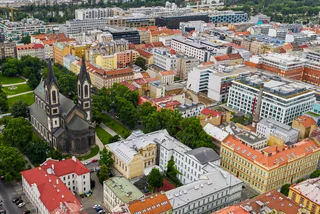A new study has found that young Czechs spend a substantially higher proportion of their wages on rent compared to their west European counterparts. Young adults in Czechia aged between 25 and 35 years spend about 40 percent of their gross monthly income on renting an average 60-square-meter (m²) apartment, while people of the same age in Germany, Austria, and France pay half that amount – if not less.
According to salary aggregatory Platy.cz, the median monthly gross wage for young Czechs is around CZK 46,000. A recent report from consulting firm Deloitte found that the average rent in the Czech Republic was CZK 295 in the first quarter of this year, meaning a 60 m² apartment would cost around CZK 17,700. With a net salary of about CZK 36,000, young adults without children need to pay almost half their actual income on housing (excluding utility bills).
Higher wages in other countries, but lower rents
In neighboring Germany, young people have a higher median wage, at around EUR 4,000 (CZK 102,000) gross per month, according to online salary tool Paylab. Despite this, the average rent for a 70 m² apartment is around CZK 15,000.
The situation is similar in Austria, where the median wage for young people is around CZK 90,000 monthly, and the average rent is around CZK 15,850 for a medium-sized apartment. Young Austrians, therefore, pay around 18 percent of their gross income towards housing.
French youth also have it cheaper, spending about one-quarter of their gross monthly salaries on rent (excluding Paris, where rent prices have surged disproportionately). Young people in Italy, however, are in a similar situation to Czechs, spending almost half their monthly gross salary (CZK 59,000) on rent.
Will the situation improve?
Although real wages in Czechia will increase by around 4 percent this year, the currently upward trajectory of rental prices nationwide – and especially in the capital – means that young renters are unlikely to see any substantial fall in prices.
Data from consulting firm Deloitte and the Rental Housing Association suggest that property rental costs will rise “moderately” this year, especially in larger cities. Experts say that Prague rental costs should rise by about 5 percent in 2024. Last year, rents rose by around 7 to 8 percent nationwide.
A separate study revealed that people in Prague must earn around 15 gross annual average Czech salaries to purchase a 70 m² apartment in Prague – the highest rate in Europe. This, in turn, puts pressure on rental prices.
“Prague is facing the biggest shortage of apartments, so we can expect the fastest price growth here…we can soon expect a faster rate of [price] growth in the Central Bohemia region too, where demand from Prague always spills over,” writes director of real estate agency Maxima Reality Vladimir Zuzák in his forecast for 2024.













 Reading time: 2 minutes
Reading time: 2 minutes 





























